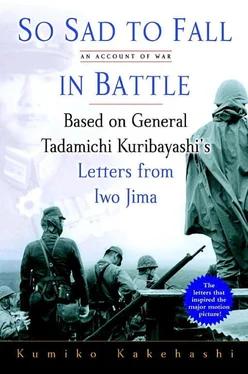Your soldier daddy
There were many white-eyes on the island and the soldiers found their singing comforting. The birds had no fear of humans and would come right up to them, an indication of just how peaceful a place Iwo Jima had been until then.
Egawa’s letter reminded me of some letters Kuribayashi had written to his youngest daughter, Takako. These also talked about young birds, though Kuribayashi was talking about chicks rather than white-eyes, as he was raising chickens for eggs as part of his effort to improve the food situation. On November 26, 1944, he wrote:
Tako-chan! One of Daddy’s mommy-hens hatched four chicks today. One of the soldiers on guard duty got her to sit on seven eggs about twenty days ago. Today four chicks popped out and are crying cheep-cheep-cheep. There are ten other chickens who spend all their time catching insects to eat so they’ve become very big.
And on December 23, 1944, he wrote:
Tako-chan… the four chicks are very well indeed and play every day as they follow their mother around. They’re always catching insects to eat. About three days after they were born, they started having fights.
Kuribayashi mentions these four chicks for the third time in the last letter he wrote to Takako—on January 28, 1945. Both he and Egawa must have transferred memories of their wives and children at home onto the heartwarming sight of mother birds with their young: “The four chicks that were born two months ago have become very big. Every day they are led around by their mother to find things to eat. I’m sorry to say they are wrecking the field I went to so much trouble to plant!”
Not wanting to worry their little children, neither Egawa nor Kuribayashi mentioned the grim state of things on the island, but looked instead for enjoyable or unusual things to write about. Other fathers probably did the same.
Censorship, which restricted the subjects that could be discussed, may have played a part, but by itself it is not an adequate explanation. Surely discovering and describing charming and beautiful things was something they needed to do to help them get through the days at the front.
In a letter to his wife, Egawa wrote:
When my unit has morning roll-call, I chant them the Imperial instructions one by one in the calm and clear morning breeze. Then I make them perform the ceremony of distant worship and greetings to the Imperial Palace.
Every evening, I assemble them for roll call with the beautiful southern sky and the palm trees in the background. After I have given them time to reflect carefully on the five clauses they swore to in the morning, as platoon commander I lead them in singing “Umi Yukaba” [“If I Go Away to Sea”]. The doctors tell me that the soldiers who are in the nearby sickroom can hear us faintly and it helps put them in a calm mood.
The forty-four-year-old Egawa was clearly performing the unfamiliar duties of a platoon leader with great diligence. Totally unlike his work as a banker, it was his first experience of military life in twenty years. It must have been tough, both physically and mentally.
The calm, clear morning breeze, the beautiful southern sky and the palms, the chorus of “Umi Yukaba” echoing faintly in the sickroom—we can see how Egawa was trying to clutch at any beauty he could find in the people or the nature around him out there on the brutal front.
There wasn’t much to delight the eye or soothe the heart. Conscious of the situation her husband was in, Mitsue sent Egawa not only photographs of the children, but frequently sent pictures they had drawn and compositions they had written. Egawa would send back his opinions on a daily basis.
Your letters were all very well written. I think I understand your drawing, Nobuko [his four-year-old second daughter]. Hiroko [his six-year-old eldest daughter], your pictures of a battledore and shuttlecock and the Japanese lantern are very well done. And I see you’ve not forgotten how to draw rabbits either.
Jun [his eight-year-old son], that steam train of yours is really something. It gave me a surprise. It’s definitely the best train you’ve ever drawn.
It was memories of his life as a father and husband back in Osaka that gave Egawa the strength he needed for life on the front. As he wrote to his wife:
When evening comes and I can relax, I always enjoy myself imagining the children, who’d be starving by this time, eating away with great energy. I imagine myself sitting opposite from Nobuko and even get the urge to speak to her.
The Japanese characters look better drawn every time you send me something written by Jun and Hiroko. I supposed I’m a besotted dad, but I feel happier somehow just holding them in my hand.
There was not much time left for Egawa to console himself by looking at his children’s pictures and handwriting. Eight days after the mail service was canceled, the Americans invaded and the brutal battle began.
Mitsue will never know when, where, or how her husband died. The battalion to which Egawa belonged was completely wiped out.
HE WAS THIRTY-SIX and she twenty-five when they got married.
Egawa had just returned to Japan from his eight-year stint in America. A fan of Hani Motoko, who founded the liberal Jiyû Gakuen private school and set up the pioneering women’s magazine Fujin no Tomo ( Woman’s Friend ), Mitsue was working as a leader in Tomo no Kai, an organization Hani had established to improve the quality of everyday life.
They married late, according to the standards of the time. “We used to laugh about my being ‘a late goer’ and him being ‘a late receiver,’” recalled Mitsue fondly.
They never once argued. When I asked her what sort of man her husband was, she replied: “He was a good person. Everybody spoke well of him. He was special: clever, kind, wasted on someone like me! And he was tall and handsome, too.”
On the day Egawa left for the front, Mitsue could not bear to listen to the members of the neighborhood association cheering “banzai.” She thanked them and, slamming the door behind her, rushed back into the house and burst into tears.
Her husband no longer belonged to the family; he was a soldier working for the good of his country. She felt empty inside as she heard the footsteps of the crowd going to see him off at the station and the whistle of the train that was taking him away.
There was a notebook squeezed in between the pages of the scrap-book Mitsue had lent me. I looked inside. It contained line after line of neat writing in fountain pen. After the war, Mitsue had copied all the letters she had been sent by her husband.
“I thought I’d get the children to read them when they were a little bit older. See, the characters on the postcards are so small they’re difficult to read.”
It was true. Every square centimeter of the postcards was covered in little ideograms, and Egawa also had the kind of flowing, elegant hand that is difficult for children to read.
It turned out that there were actually two notebooks in the scrap-book, and the postcards had been faithfully copied into the second one, too. Mitsue had performed the same task twice.
Why two notebooks? I wanted to ask her, but I restrained myself. After the war, Mitsue had worked her fingers to the bone while also looking after her three children, an aging father-in-law, and a handicapped brother-in-law.
In my mind’s eye I could picture her concentrating on copying her husband’s letters long after the rest of the family had gone to bed. Meditating on the words her husband left behind and storing them in her heart must have somehow made the days easier to bear.
I am a commonplace, difficult husband, but as a wife you have really helped and supported me. As for the children, you are a good and diligent mother, and at this late stage I cannot properly express the gratitude I owe you.
Читать дальше












